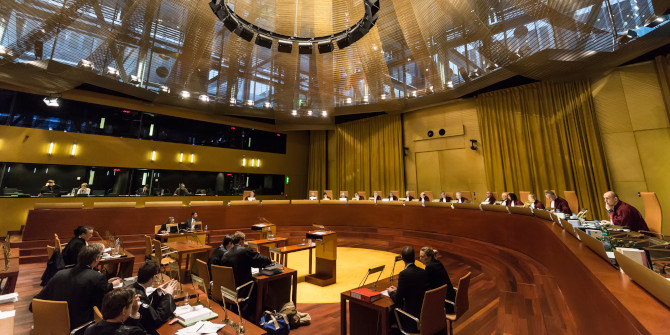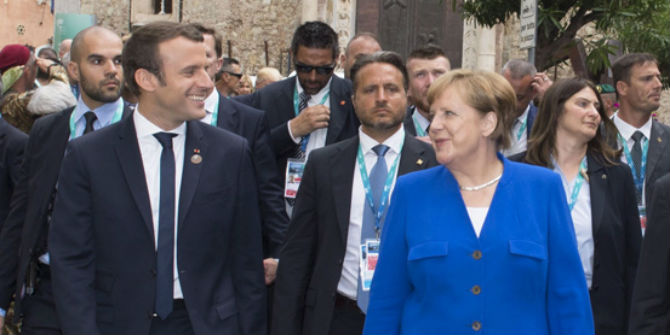Rulings made in the Court of Justice of the European Union often generate controversy in the member states, but how can national governments respond to decisions they disagree with? Drawing on a new study, Olof Larsson explains the use of ‘overrides’, where laws are changed following a ruling to bring them more in line with what national politicians want.
According to many scholars, the member states of the EU are essentially trapped in a legal system they no longer control. Important policy decisions are systematically determined by unelected judges at the Court of Justice of the European Union, and not by elected politicians. Other scholars, like myself, argue that while the EU Court has a lot of power, the member states retain powerful means by which to influence the Court and the development of EU law.
One key question in this debate concerns how EU governments react when the Court of Justice hands down controversial decisions. If the Court says that EU law means X, and politicians want it to mean Y, what do the politicians do? In a recent study, I discuss whether politicians can, and have, reacted by changing the laws concerned. These changes are overrides, i.e. actions taken by politicians to change the impact of court decisions.
The Court of Justice of the EU is justly famous for making controversial decisions. These have changed the status, reach and power of EU law, and had dramatic policy ramifications across Europe. Well-known examples include the application of EU working time law in the UK; gender equality in relation to pay; the degree to which companies operating across borders can invoke EU law to avoid paying various social fees and taxes; and the rights of unions, refugees and cross-border workers, just to name a few.

A hearing of the Court of Justice Grand Chamber, Credit: Court of Justice of the European Union
Politicians have several means of responding to/adjusting these decisions. One of these is via overrides, which essentially means changing the laws to bring them in line with what politicians want. My study provides details on ten such overrides – three of which changed the EU’s founding treaties, and seven of which were enacted through EU ‘directives’. Some of these completely undid what the Court had decided in a certain case, while others simply made modifications. To be clear, none of these changes were political attacks on the Court as such – they were policy-specific changes to the laws concerned. For example, should someone with a brief summer-time job in another member state enjoy the full rights of EU workers? The law was unclear, the Court said ‘yes’, but later the member states clarified the law, and made it say ‘no’.
A recent example is changes to the Posting of Workers Directive. Throughout the 1990s and the 2000s, a recurring political conflict emerged over whether employers from other EU member states had to conform to national rules on minimum wages and collective agreements between unions and employers or not. While the member states and the European Parliament adopted an EU law to protect union rights and minimum wages in the 1990s, the intended purpose of this law was undermined by the Court throughout the 2000s.
The Court was supported in this endeavour by the UK and many eastern European member states, while most others resisted these changes. However, once states such as France, Germany, Sweden and others managed to marshal the necessary votes to override the Court in 2018, they did. In 2018, the EU Council and Parliament amended the Posting of Workers Directive in ways that neutralised parts of the Court’s previous impact.
Why don’t we see more overrides?
But if this is true, then why have so many other important decisions taken by the EU Court been left as they are and not overridden? Simply put, most controversial decisions are supported by a powerful member state. Specifically, there are extremely few cases in which the outcome has not been supported by either France, the UK or Germany, or a wide coalition of smaller states. For most EU law classics, such as Van Gen den Loos, Cassis de Dijon & Keck, the UK v Council (regarding working time), or Rüffert and Laval, at least one big state supported the Court. The member states might not have done so publicly, but recent research has uncovered more and more of these patterns (see for example the work by Billy Davies on German reactions to Court decisions).
This is not to say that the member states ‘dominate’ the EU Court. The Court has ample space to decide cases any way it wants without being overridden, as long as it navigates in between the preferences of the member states. From 1958 up until around 2010, this space was fairly stable: decisions emphasising free markets over national regulatory systems (often called ‘neoliberal’ decisions) would garner the support of the UK and after 2004 eastern Europe; decisions pushing social policies up to the EU level would garner the support of France, often Germany, later also Sweden, Austria, and others. Germany was a strong supporter of decisions which strengthened the status of EU law and the Court itself; others, like France, were often sceptical.
Brexit and beyond
Brexit will mean a tectonic shift in this legal-political game. Not only will the states and actors who have taken opposite positions to those of the UK be stronger in the Council, their position will also strengthen in the Court.
Overrides are increasingly politically important today, and the reasons go beyond recent earthquakes like Brexit. First of all, as the EU Court increasingly takes up the challenge to defend fundamental democratic rights and values, I believe that support from member states will become more and more important. At the end of the day, if one member state openly defies the Court or the EU system in general, only the other member states are powerful enough to bring it back into line.
Secondly, no legal system is frozen in time, and certainly not the EU’s. Sure, there are political projects which might be practically impossible within the EU as it looks today. However, the degree to which this depend on some fundamental characteristic of the Union or its treaties is widely exaggerated. Anyone whose personal political project seems to be in conflict with Luxembourg today should know that EU laws can change over time, and so can the treaties, along with how they are interpreted.
In short, the EU law we have today has been moulded in politics, and as politics changes, so will EU law. Critics are right to point out that the role of the EU Court can lead to big discrepancies between what voters want and what kind of policy is carried out, both at the EU and the national level. But EU law is still influenced by its political milieu, and big changes in it will have consequences. For example, had a Corbyn-style Labour led the UK since say 1979 and onwards we would be living in an EU that was substantially more left-wing, regardless of what the EU treaties say.
Note: For more information, see the author’s accompanying paper in the Journal of European Public Policy. This article gives the views of the author, not the position of EUROPP – European Politics and Policy or the London School of Economics. Featured image credit: Court of Justice of the European Union





